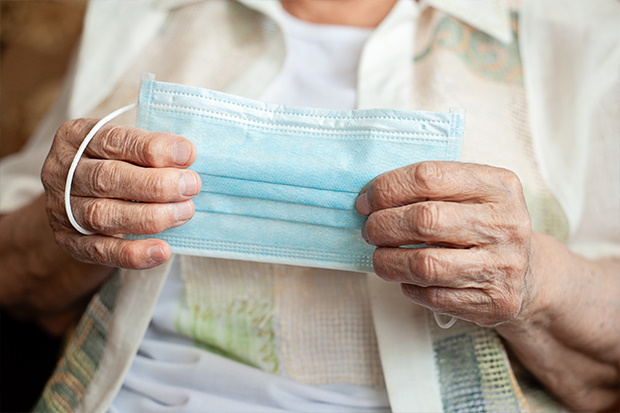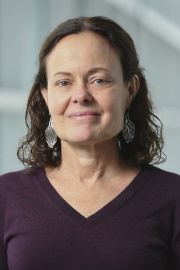Students study seniors' views of COVID-19
In Sarah Lamb's anthropology class, the students extensively interviewed older adults about their reactions to the virus and even whether they'd be willing to let younger people get treatment before them.

Five students in Sarah Lamb’s Anthro 95a class this spring got to ask a group of older people one of the most wrenching ethical questions of the COVID-19 era:
If they got sick, would they be willing to step aside and let someone younger receive treatment before them? With life-saving equipment such as respirators scarce and emergency rooms flooded, it wasn't a hypothetical scenario.
Anthro 95a was designed as an undergraduate research seminar focused on general issues surrounding healthy and successful aging.
Under the direction of Sarah Lamb, Barbara Mandel Professor of Humanities and Humanistic Social Sciences, the students were to have lengthy conversations with older people and then write up their observations.

Sarah Lamb
Lamb researches aging and gender with a special focus on ideas about "successful aging," the notion that individuals can postpone or even eliminate the negatives of old age through medical intervention and individual effort.
But as the virus spread, the seminar discussions turned increasingly to the subject of COVID-19. Lamb then decided to shift the focus of many of the questions to the coronavirus.
Fifteen individuals, ranging in age from 71 to 93, were research subjects. Several were participants in the Osher Lifelong Learning Institute at Brandeis (BOLLI). The conversations, held over Zoom, lasted over an hour.
In addition to questions about bioethics, the students asked how COVID-19 affected the seniors' religious views, feelings of vulnerability, and sense of their mortality.
"The students found it really fascinating to think about aging, lifespan, intergenerational relations, and the role of religion in later life," said Lamb, who last year was named an Andrew Carnegie Fellow and received a so-called “Brainy Award," a $200,000 grant to do research, writing, and publishing in the humanities and social sciences. "They said they could more fully imagine their own aging now and have more meaningful conversations with their own older relatives."
Anthro 95a, which started in the fall with an option to continue in the spring, lets students collaborate with Lamb on her research. Students conduct and transcribe the interviews and then apply anthropological methods to analyze them.
"The key methods of anthropologists are fieldwork and interviewing people," Lamb said. "The students read all about this in books, but this lab-like course gives them a chance to do it."
For their final assignment, the students wrote papers and created PowerPoint presentations.
The students used methods of coding and memoing to look for key themes in the data, then reflect on and analyze them, Lamb said.
Below are excerpts from some of the students' final essays:
Tirtza Schramm '23
Several elders cited the sense of security that religion provides in the most uncertain area of existence: death. [One participant] says, "It gives people the expectation or hope or fantasy that life will go on, they will be reborn, or the soul will be in heaven or whatever it might be. ... Our species has been, I wouldn't say consumed with, but certainly engaged in hoping for something later."
Something of particular interest to me was a line said by an elder in passing. [She] said, "I don't know about religion. ... And even, you know, when I say I'm agnostic, the moments in my life which have been really tough, I've just gotten down on my hands and knees and [said], ‘Please, God, not today.'" This quote grabbed me, and I began thinking about the widely known phrase, "There are no atheists in a foxhole."
Gabriela Mendoza '22
One of the first people whom we interviewed about COVID-19 was [name omitted]. In her interview, she brought up some of the ethical dilemmas and said: "You know, my rational self is 77 and says, 'Well, you know, if someone is 35 and has at least that much longer to live, and [there] is one ventilator, and it's me or them, I guess I have to vote for them' — but it never should come to that. And the reality is that older people have a lot to contribute. I still am not quite at the point where I think of myself as an older person. I mean, I am chronologically, but I still think I have a significance to make — and certainly in the lives of people who care about me and also in the world."
I found this quote particularly interesting because it has been instilled into our society that older people no longer have much to contribute, but we do not often take into consideration that they may not feel that way.
Xinbei Lin '21
Out of curiosity, we brought the question to the elders we interviewed: Would you agree with giving young people the priority to use a ventilator and other life-supporting systems over the elders if there's a shortage of medical resources?
Among the five elders who answered this question during interviews in April, only one agreed to give priority to younger people without the least hesitation, while the rest of the elders appeared confused, hesitant, or even slightly irritated when faced with this question. ...
Their responses had something in common. Elders, even at their later stage of life, still have responsibilities they hold, and they are looking forward to the future like many young people. [One participant] said: "I've had a good life as well, but I don't think I want to say, ‘Let them have it.’" He then explained that he could not give up his own life when he needed to take care of his wife who was diagnosed with cancer before the pandemic.
I haven't directly asked any younger people the same question, but I managed to bring up the topic with a friend of my age. She was bothered by my question. She told me that it would be hard to decide, but she would have to give the ventilator to the elders because younger people are said to be more resistant to the virus.
Lamb and her students published their findings on the websites of Somatosphere and the Association for Anthropology and Gerontology, and the Life Course (AAGE).
Categories: General, Humanities and Social Sciences, Student Life





